There is a club in this world that you do not join knowingly. One day you are just a member.
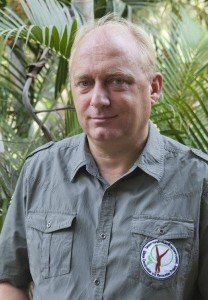 The club is “The Life Changing Events Club.” The fee to join takes many different forms. For some it can be the death of a spouse or a child, for others it can be a diagnosis of a potentially fatal disease. In the case of Edwin Wiek, it was a serious car accident that brought him to death’s door.
The club is “The Life Changing Events Club.” The fee to join takes many different forms. For some it can be the death of a spouse or a child, for others it can be a diagnosis of a potentially fatal disease. In the case of Edwin Wiek, it was a serious car accident that brought him to death’s door.
At the age of 17 Edwin left school and joined the army. After doing his stint he got into the fashion business, a line of business that was familiar to his family. In short order he was promoted to buying assistant and traveled to interesting countries. Soon he was in Asia designing fashion accessories.
At the young age of 23 he moved to Hong Kong and started his own company. In 1989 he moved to Thailand and set up a factory. Ten years later, on a fateful day, Edwin was involved in a serious car accident. During his long recovery Edwin realized that he wanted to leave something behind that wasn’t just rooted in money or business success.
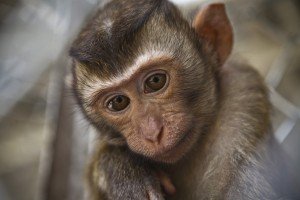 In August of 1999, a friend gave Edwin a monkey that he no longer wanted. Edwin started looking for wildlife NGO’s (non-governmental organization) which could take the monkey. He found that there were no proper facilities that could help so he decided to get out of the fashion business and set up his own organization looking after helpless animals.
In August of 1999, a friend gave Edwin a monkey that he no longer wanted. Edwin started looking for wildlife NGO’s (non-governmental organization) which could take the monkey. He found that there were no proper facilities that could help so he decided to get out of the fashion business and set up his own organization looking after helpless animals.
Edwin’s organization rescues wild animals from places where they are maltreated and/or neglected, and help them to spend the rest of their lives in a sanctuary as close to their natural environment with the best possible care.
Edwin’s organization is also involved in education, particularly children, to stop cruelty to animals. They campaign against the illegal trade in wild animals for the pet industry and discourage the use of animals for entertainment, for example in performing animal shows
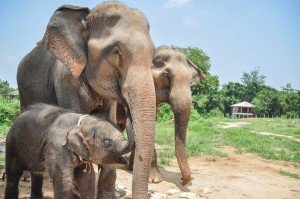 Located just 20 minutes from Hua Hin, Edwin’s Wildlife Friends Foundation is an independent, self-funding NGO that rescues badly treated animals providing medical treatment and if necessary lifetime shelter.
Located just 20 minutes from Hua Hin, Edwin’s Wildlife Friends Foundation is an independent, self-funding NGO that rescues badly treated animals providing medical treatment and if necessary lifetime shelter.
HOT Magazine recently had the pleasure of sitting down with Edwin to discuss his Foundation and the amazing care they give to god’s hurting creatures.
HOT Magazine: Tell us about what you do.
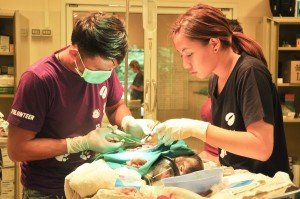 Edwin Wiek: I founded the Wildlife Friends Foundation Thailand (WFFT) in 2001 and have since built up an organization, which provides full-time care for almost 1200 wild animals, and has rescued over 5,000 wild animals since its inception over 14 years ago. We manage two wildlife rescue centers, one in Thailand and one in Laos with 115 staff members and 60 volunteers. Along with the direct care of wildlife we also run various other projects and wildlife protection campaigns.
Edwin Wiek: I founded the Wildlife Friends Foundation Thailand (WFFT) in 2001 and have since built up an organization, which provides full-time care for almost 1200 wild animals, and has rescued over 5,000 wild animals since its inception over 14 years ago. We manage two wildlife rescue centers, one in Thailand and one in Laos with 115 staff members and 60 volunteers. Along with the direct care of wildlife we also run various other projects and wildlife protection campaigns.
HOT Magazine: What led you to take on such an initiative?
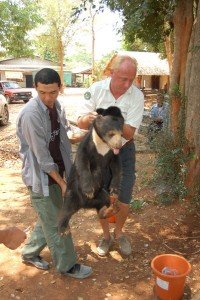 Edwin Wiek: In October 1999 I fell asleep behind the wheel of my car on my way back from a business meeting, I had almost ended my life there and then. After such a life changing experience I felt fortunate to have survived and realized my life was not as fulfilled as it should be. During the months after the accident I evaluated my life and my business (I was the director of a factory that produced fashion accessories here in Thailand) and decided I wanted something different. During this time a friend handed over a monkey to me that he had bought for his girlfriend and could not keep any longer. I tried to find a suitable home for the monkey but was not able to, finding a wildlife rescue facility in Thailand was almost impossible, and soon the idea of building a home for wild animals like this monkey started to become a target of mine.
Edwin Wiek: In October 1999 I fell asleep behind the wheel of my car on my way back from a business meeting, I had almost ended my life there and then. After such a life changing experience I felt fortunate to have survived and realized my life was not as fulfilled as it should be. During the months after the accident I evaluated my life and my business (I was the director of a factory that produced fashion accessories here in Thailand) and decided I wanted something different. During this time a friend handed over a monkey to me that he had bought for his girlfriend and could not keep any longer. I tried to find a suitable home for the monkey but was not able to, finding a wildlife rescue facility in Thailand was almost impossible, and soon the idea of building a home for wild animals like this monkey started to become a target of mine.
HOT Magazine: What is it that you like the most about your job? Moreover, in what do you find the gratification of your efforts?
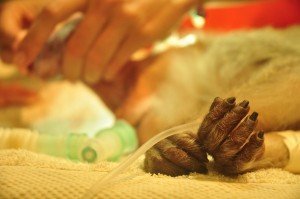 Edwin Wiek: The good moments are the moments you rescue an animal in need of help and you realize you can help them (in some cases we are too late). The best moments are the moments you can rehabilitate and release some of those animals back to the wild, giving them a new chance of life. Whenever I sit on my balcony at home, I am surrounded by the sounds, sights and smells of the animals rescued by WFFT, bears, elephants or Gibbons among many others are around me having fun, this constantly reminds me why the work I do is so important.
Edwin Wiek: The good moments are the moments you rescue an animal in need of help and you realize you can help them (in some cases we are too late). The best moments are the moments you can rehabilitate and release some of those animals back to the wild, giving them a new chance of life. Whenever I sit on my balcony at home, I am surrounded by the sounds, sights and smells of the animals rescued by WFFT, bears, elephants or Gibbons among many others are around me having fun, this constantly reminds me why the work I do is so important.
HOT Magazine: What is it that you like the least about your job? How do you attempt to cope with these aspects?
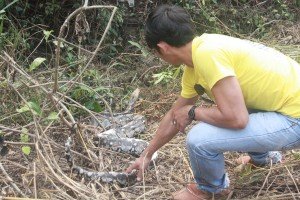 Edwin Wiek: Politics. Unfortunately numerous government officials and politicians make lots of money out of elephant camps and other unethical wildlife tourist attractions, and from the illegal wildlife trade. We as an NGO with the objectives of animal welfare and wildlife conservation, of course directly oppose such people and their practices. Working with the government is a must, but unfortunately due to the involvement of some officials with the exploitation or trade of wildlife makes it difficult at some times.
Edwin Wiek: Politics. Unfortunately numerous government officials and politicians make lots of money out of elephant camps and other unethical wildlife tourist attractions, and from the illegal wildlife trade. We as an NGO with the objectives of animal welfare and wildlife conservation, of course directly oppose such people and their practices. Working with the government is a must, but unfortunately due to the involvement of some officials with the exploitation or trade of wildlife makes it difficult at some times.
HOT Magazine: Describe the Wildlife Friends Foundation in one word. Why do you chose that word?
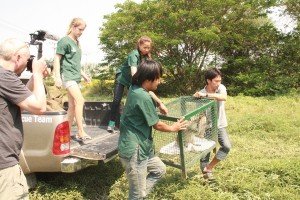 Edwin Wiek: Dream. It started as a dream for me, as I was fantasizing about starting this foundation 15 years ago. We worked hard to make it happen, let it grow sustainably and make it one of the best in Asia. With currently a wildlife rescue center and an elephant refuge in Thailand and another rescue center in Laos, it is like living the dream, and things are still to get even better. We keep on dreaming.
Edwin Wiek: Dream. It started as a dream for me, as I was fantasizing about starting this foundation 15 years ago. We worked hard to make it happen, let it grow sustainably and make it one of the best in Asia. With currently a wildlife rescue center and an elephant refuge in Thailand and another rescue center in Laos, it is like living the dream, and things are still to get even better. We keep on dreaming.
HOT Magazine: What vision for the future do you have in regard to the Wildlife Friends Foundations, what steps do you want it to have taken in say, ten years’ time?
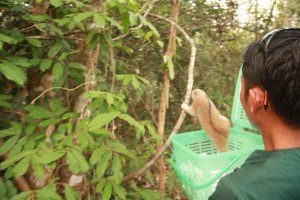 Edwin Wiek: Since early 2015 we have been working in Laos setting up a large rescue center, this is a big challenge but we are hopeful that it will be a success. With over 700 animals there already we need all the help we can get, to upgrade and rebuild many old zoo facilities, and continue with setting up a world class wildlife rescue facility in Laos. At the same time we are building a state of the art elephant hospital in Petchburi, Thailand, not far from Hua Hin. Along with the current pachyderms at WFFT we hope to start treating blind and other elephants in need from tourist camps within 2016. We hope to also start a wildlife rescue facility in Burma by 2017, so many things to do!
Edwin Wiek: Since early 2015 we have been working in Laos setting up a large rescue center, this is a big challenge but we are hopeful that it will be a success. With over 700 animals there already we need all the help we can get, to upgrade and rebuild many old zoo facilities, and continue with setting up a world class wildlife rescue facility in Laos. At the same time we are building a state of the art elephant hospital in Petchburi, Thailand, not far from Hua Hin. Along with the current pachyderms at WFFT we hope to start treating blind and other elephants in need from tourist camps within 2016. We hope to also start a wildlife rescue facility in Burma by 2017, so many things to do!
HOT Magazine: What feelings do the news of mistreated animals, be it because of the value of their bodies or because of the taboo associated to them evoke in you?
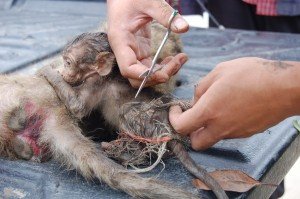 Edwin Wiek: The first few years I used to get furious at people mistreating animals, arriving at a rescue site I would witness animals housed in small and dirty enclosures or restrained with a very tight chain, in some cases the animal had spend up to 20 years in solitary confinement. After a few years I found that showing my emotions in front of these “owners” did not really help my cause, some were oblivious to the treatment (read torture) they provided to the animal, in some cases not even wanting a better life for their ‘beloved’ pet. Nowadays I am friendly, understanding and diplomatic to the people who keep these wild animals and I will not show my feelings. I do whisper and apologize into the ear of the animal and tell them that from this day on all is going to get better!
Edwin Wiek: The first few years I used to get furious at people mistreating animals, arriving at a rescue site I would witness animals housed in small and dirty enclosures or restrained with a very tight chain, in some cases the animal had spend up to 20 years in solitary confinement. After a few years I found that showing my emotions in front of these “owners” did not really help my cause, some were oblivious to the treatment (read torture) they provided to the animal, in some cases not even wanting a better life for their ‘beloved’ pet. Nowadays I am friendly, understanding and diplomatic to the people who keep these wild animals and I will not show my feelings. I do whisper and apologize into the ear of the animal and tell them that from this day on all is going to get better!
HOT Magazine: What message would you like to broadcast to our readers in relation to this? How can each person do their part to prevent this directly or indirectly?
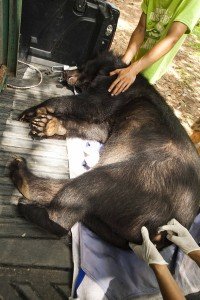 Edwin Wiek: First of all do remember that if it is considered illegal or unethical in your country it probably is here too. I mean here in particular the exploitation and/or consumption of wildlife, Tigers or elephants and many other species is very common. When you see animals in a very bad condition at a camp or zoo that you visit and paid an entrance for, you are supporting this exploitation. Thailand has plenty of fascinating wild animal species living within its National parks, so if tourists or residents wish to see elephants or other wildlife, the best way is to visit these national parks and see these animals free in their natural habitat.
Edwin Wiek: First of all do remember that if it is considered illegal or unethical in your country it probably is here too. I mean here in particular the exploitation and/or consumption of wildlife, Tigers or elephants and many other species is very common. When you see animals in a very bad condition at a camp or zoo that you visit and paid an entrance for, you are supporting this exploitation. Thailand has plenty of fascinating wild animal species living within its National parks, so if tourists or residents wish to see elephants or other wildlife, the best way is to visit these national parks and see these animals free in their natural habitat.
HOT Magazine: We end with two quotes from one of the more outspoken animal rights activists of the nineteenth and early twentieth centuries: “There are no wild animals until man makes them so” said Mark Twain. How do you feel about this quote?
Edwin Wiek: Well actually all animals were wild, until we tortured and tamed some.
HOT Magazine: “The more I learn about people, the more I like my dog”. Do you have hope for a world in which humans are able to renounce their selfishness and cruelty and start respecting the livelihood and individual rights of all animals? What do you think Twain would say were he alive today?
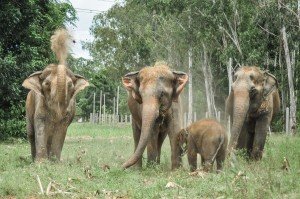 Edwin Wiek: With this one I can associate! We humans might be the most intelligent of all species on earth, but at the same time we are complicated, full of politics and sometimes straight-out evil. Dogs are there for you at all times, happy when you return home, even when you have left them for weeks!
Edwin Wiek: With this one I can associate! We humans might be the most intelligent of all species on earth, but at the same time we are complicated, full of politics and sometimes straight-out evil. Dogs are there for you at all times, happy when you return home, even when you have left them for weeks!
If you would like more information on the Wildlife Friends Foundation, or if you would like to volunteer or donate, visit their website, www.wfft.org.


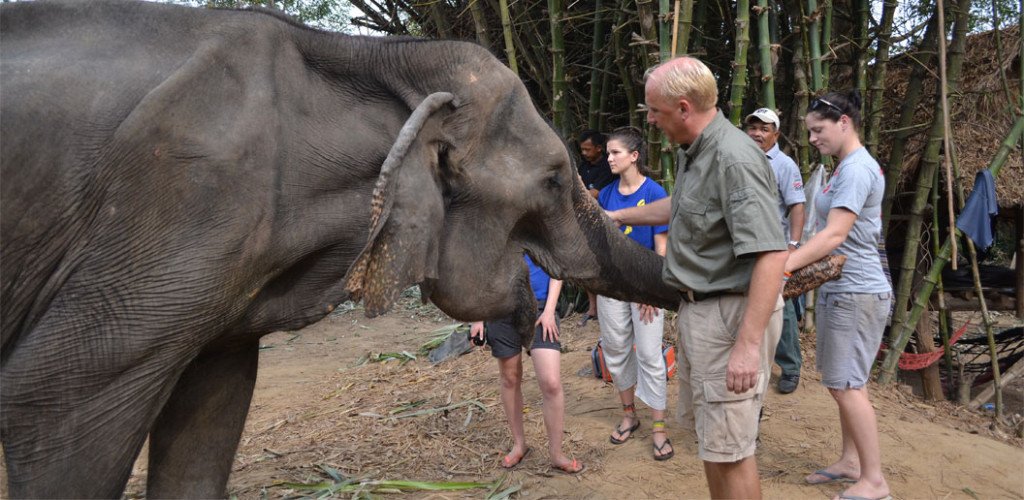
1 Comment
Pingback: 10 Reasons Why You Shouldn't Ride an Elephant in Thailand | Words of a Wanderer